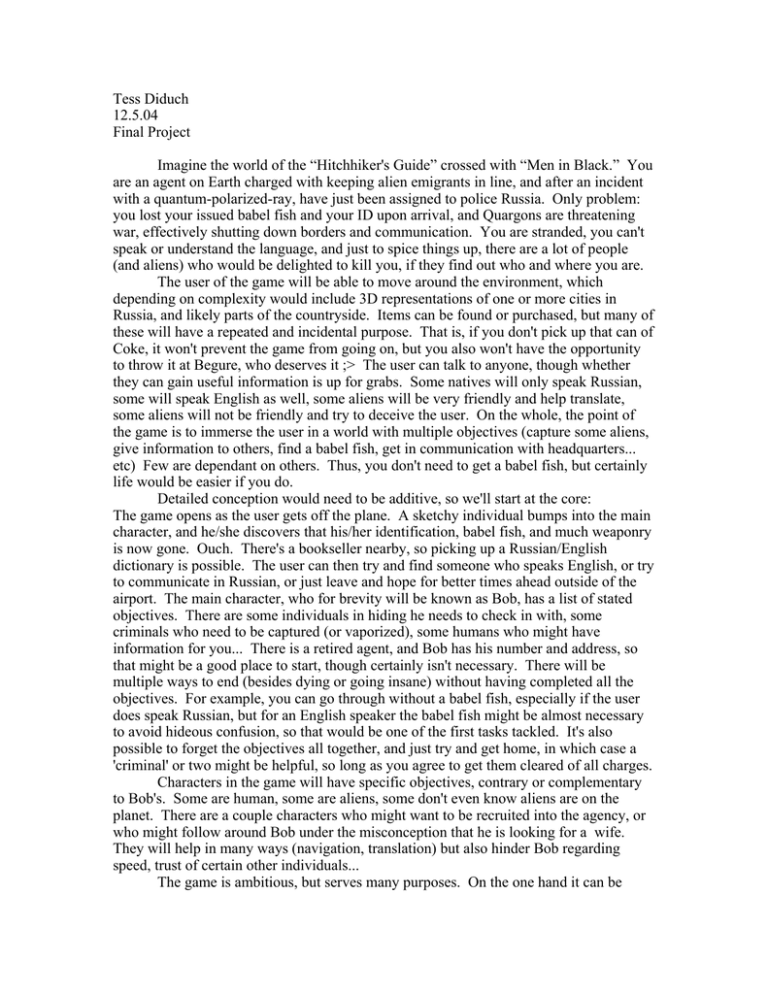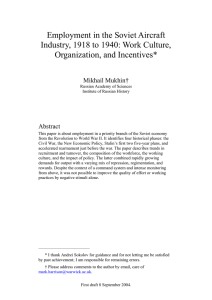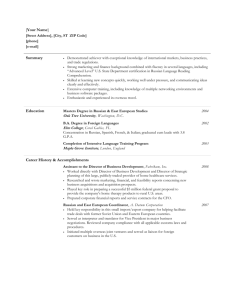Tess Diduch 12.5.04 Final Project
advertisement

Tess Diduch 12.5.04 Final Project Imagine the world of the “Hitchhiker's Guide” crossed with “Men in Black.” You are an agent on Earth charged with keeping alien emigrants in line, and after an incident with a quantum-polarized-ray, have just been assigned to police Russia. Only problem: you lost your issued babel fish and your ID upon arrival, and Quargons are threatening war, effectively shutting down borders and communication. You are stranded, you can't speak or understand the language, and just to spice things up, there are a lot of people (and aliens) who would be delighted to kill you, if they find out who and where you are. The user of the game will be able to move around the environment, which depending on complexity would include 3D representations of one or more cities in Russia, and likely parts of the countryside. Items can be found or purchased, but many of these will have a repeated and incidental purpose. That is, if you don't pick up that can of Coke, it won't prevent the game from going on, but you also won't have the opportunity to throw it at Begure, who deserves it ;> The user can talk to anyone, though whether they can gain useful information is up for grabs. Some natives will only speak Russian, some will speak English as well, some aliens will be very friendly and help translate, some aliens will not be friendly and try to deceive the user. On the whole, the point of the game is to immerse the user in a world with multiple objectives (capture some aliens, give information to others, find a babel fish, get in communication with headquarters... etc) Few are dependant on others. Thus, you don't need to get a babel fish, but certainly life would be easier if you do. Detailed conception would need to be additive, so we'll start at the core: The game opens as the user gets off the plane. A sketchy individual bumps into the main character, and he/she discovers that his/her identification, babel fish, and much weaponry is now gone. Ouch. There's a bookseller nearby, so picking up a Russian/English dictionary is possible. The user can then try and find someone who speaks English, or try to communicate in Russian, or just leave and hope for better times ahead outside of the airport. The main character, who for brevity will be known as Bob, has a list of stated objectives. There are some individuals in hiding he needs to check in with, some criminals who need to be captured (or vaporized), some humans who might have information for you... There is a retired agent, and Bob has his number and address, so that might be a good place to start, though certainly isn't necessary. There will be multiple ways to end (besides dying or going insane) without having completed all the objectives. For example, you can go through without a babel fish, especially if the user does speak Russian, but for an English speaker the babel fish might be almost necessary to avoid hideous confusion, so that would be one of the first tasks tackled. It's also possible to forget the objectives all together, and just try and get home, in which case a 'criminal' or two might be helpful, so long as you agree to get them cleared of all charges. Characters in the game will have specific objectives, contrary or complementary to Bob's. Some are human, some are aliens, some don't even know aliens are on the planet. There are a couple characters who might want to be recruited into the agency, or who might follow around Bob under the misconception that he is looking for a wife. They will help in many ways (navigation, translation) but also hinder Bob regarding speed, trust of certain other individuals... The game is ambitious, but serves many purposes. On the one hand it can be played as a highly interactive game in the vein of what Douglas Adams originally wanted. Random small plots provide entertainment and immersion within the game, so the user is encouraged to explore the full range of what the game designers came up with. It thus also replicates what it would be like to be in this situation, rather than having a game where the environment is there simply to hold the series of events and puzzles that need to be solved to complete the game. On the other hand, this is a tool to learn Russian. A translation book would be a tool that can be pulled up, (though of course any translation materials in the real world can also be used), which is good perhaps for midcompetence speakers. All conversations will be spoken as well as textually recorded. Characters will answer questions about what certain things mean. One character is even an English teacher and can help explain the grammar. Basically, there will be numerous tools for learning Russian, such that the user can figure out what's going on and keep going through the game, learning bits as they go along, rather than having to know Russian from the get-go. But it is also easy to play the game without learning any Russian at all, so frustration levels should be very low. Instead, it provides a fun way to learn Russian if the user so desires, as well as a fun game.






